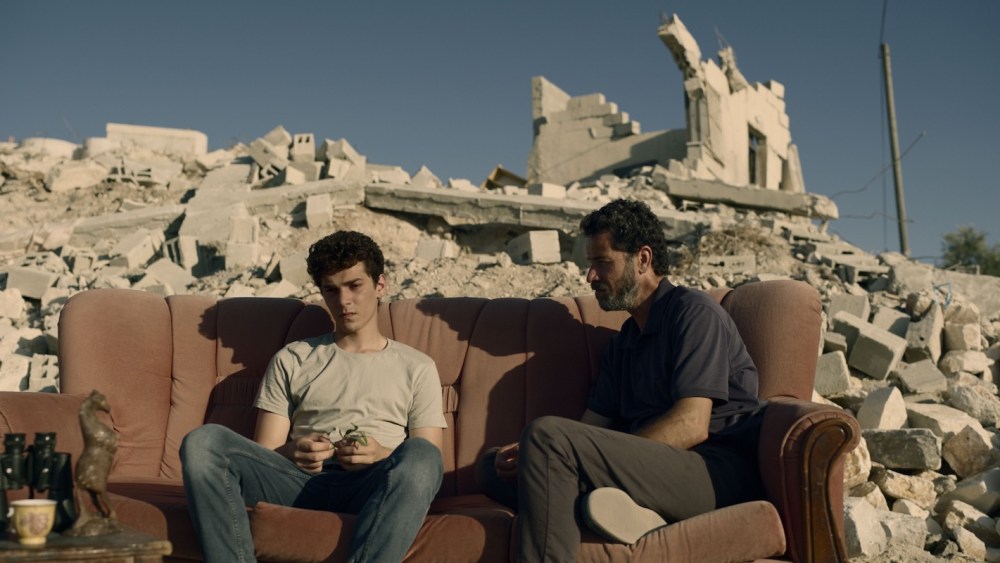A Powerful but Imbalanced West Bank Drama
With her feature debut “The Teacher,” Palestinian British filmmaker Farah Nabulsi attempts to shine a light on the absurd indignities of living under military occupation. Set in the West Bank — where it was also filmed, over a three-month period — the 2023 Toronto Film Festival selection follows a troubled Palestinian schoolteacher wrestling with his political allegiances at a particularly fraught time for a student he takes under his wing.
Nabulsi’s inter-generational drama is carefully composed, though the movie’s other subplots (concerning its handful of American and British characters) tend to be more stilted. Where “The Teacher” most succeeds is in its deft balance between the internal and external realities of its Arab protagonists, which are constantly forced out of alignment by the violence around them.
With winding shots of English teacher Basem (Saleh Bakri) driving to work, Nablusi introduces us to the movie’s tense but warm and picturesque atmosphere, the venue for unpredictable changes in the status quo. Two of Basem’s teenage students — the older, rowdy Yacoub (Mahmoud Bakri) and the younger, booksmart Adam (Muhammad Abed El Rahman) — share his class despite their age difference, owing to Yacoub’s stint in Israeli detention. Yacoub is lucky, despite the troubles that have befallen him, in that he not only has Basem looking out for his best interests, but a British humanitarian social worker too, Lisa (Imogen Poots), who checks in on him from time to time.
However, no amount of care or good intentions can prevent the sudden demolition of the brothers’ home, courtesy of a vague order from the IDF — for which the family is even forced to pay. This is one of several painful humiliations endured by the movie’s Palestinian characters (the kind also presented in the Oscar-winning documentary “No Other Land”), for which they’re shown to have little legal recourse. With few options left, Adam begins considering and concocting ways to enact vengeance, but Basem, having been down that rageful path, advises him otherwise.
The father-and-son-like tensions between Basem and Adam (presented with matter-of-fact frankness) are a central fixture of the movie’s drama, resulting in a pair of deeply alluring performances that always feel on the verge of explosion. The premise requires both actors not just to showcase a fiery vulnerability, but to stew in these feelings for extended periods, which benefits from Nabulsi’s straightforward, no-frills presentation. Even the B plots that don’t quite work — like Basem’s blossoming romance with Lisa — are infected by this inertia, and the emotional burdens placed on Basem and Adam by authoritarian bootheels.
When you have no outlet for your rage, all you can do is aim it inward. However, the more we learn about Basem, from his own tragic past — as a father whose son was given a lengthy sentence for protesting — to his secret entanglements with underground resistance movements, the more complicated this notion of effectively channeling emotions becomes. Elsewhere, an American diplomat (Stanley Townsend) and his wife (Andrea Irvine) visit Tel Aviv in the hopes of rescuing their son, an IDF soldier taken hostage by one of the aforementioned groups, who demand the release of a thousand Palestinian detainees in exchange for his freedom. These two stories, of fathers trying to liberate younger generations from the violence they face, work nicely in tandem, even though the Israeli half of the movie’s drama verges on being overly explanatory.
This prisoner scenario echoes the real story of IDF soldier Gilad Shalit — who was set free in exchange for 1,027 Palestinians — an imbalance of personal and cultural value which Nabulsi attempts to investigate. Unfortunately, the question of how much worth is placed on an Israeli life versus a Palestinian one is answered mostly in words, and thus, in too direct (and perhaps too didactic) a fashion, when so much of the movie’s drama could have grounded it emotionally. After all, “The Teacher” depicts the horrors and indignities people are forced to accept just go on living, but the aforementioned calculus isn’t allowed to play out with the same visceral realizations as other instances — like the unavoidable, bureaucratic destruction of Adam’s home.
Much of what’s depicted in “The Teacher,” from homes being bulldozed to destructive attacks from settlers, also unfolded around the production, according to Nabulsi. The film, therefore, comes imbued with a charged sense of verisimilitude, thanks in no small part to its performers’ keen ability to not sit with mounting pressures, but to silently convey the ensuing possibilities, and even impossibilities, often without words. What the characters can or cannot do in response, and the catharsis they’re prevented from attaining, are both key parts of their story, and of life in the West Bank at large — a reality Nabulsi conveys in stark, realistic hues, despite her first-feature growing pains.


